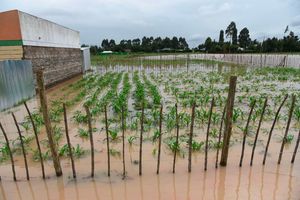Premium
Mombasa or Dar es Salaam? Uganda decides

Ugandan President Yoweri Museveni.
Last week, Uganda announced it would no longer purchase petroleum products from Kenya after middlemen inflated prices by up to 59 per cent, imposing too high a cost on consumers.
In the new arrangement, Uganda National Oil Company (UNOC) will be buying the country’s fuel stock from refiner Vitol Bahrain and distributing it to local oil marketing companies (OMCs), transporting it through the key ports of Mombasa in Kenya and Tanzania’s Dar es Salaam.
Part of the wrinkle for the Ugandan government follows Kenya’s decision earlier in the year to drop the open tender system (OTS) in favour of direct procurement under a government-to-government deal with Saudi Arabia and the United Arab Emirates (UAE).
In the G-to-G deal, state-owned firms Saudi Aramco, Abu Dhabi Oil Company (ADNOC) and Emirates National Oil Company (Enoc) were given the freedom to handpick local OMCs to distribute fuel on their behalf. They chose three.
Because Kenya-based OMCs supply 90 per cent to Uganda, Kampala seems to feel let down because Nairobi didn’t consult it before making the move that has led to irregular supplies and a higher price tag.
It would seem a fairly straight story but isn’t. Kenyan media and other commentators almost uniformly said Uganda had “banned” fuel imports from Kenya and that it was a slap in the face for President William Ruto.
It was probably stretching it a little too far to see this as a rebuff of President Ruto, or a fallout because Uganda’s President Yoweri Museveni sent a delegation to give him a heads-up
However, the move by Kampala doesn’t ban Kenyan oil, and the devil is in the detail. The amendment to the Petroleum Supply Act that will give legal force to the new order “authorises the Minister [of Energy], with the approval of Cabinet, to nominate any other person to import petroleum products for the Uganda market”.
Should the new deal, with UNOC at the centre flounder, that provision opens a back door for imports from Kenya. One can almost be sure that some fuel will be imported through that channel because the back door is now a very precious instrument for the minister and other powerful people to trade in for a big cheque.
Tanzanian media, on the other hand, said Uganda has chosen the Dar port for its oil imports “after fallout with Kenya”.
This presentation of events is understandable from a coastal perspective. Landlocked countries like Uganda are never absolutist in their policy and relationship with their neighbours who give them access to sea ports for their exports and imports. It is not because they don’t despise or even hate them. They do.
I have been in rooms where ministers and officials from East Africa’s landlocked nations have said the most terrible things about their coastal neighbours and, two days later, watched in awe at their pragmatism as they held their noses, showered them with praises, gave them bear hugs and kissed them on the cheek.
If you are landlocked, you learn to run with the hare and hunt with the hounds to survive. Museveni, for all his outspokenness, is careful to rub the occupants of the Kenyan and Tanzanian state houses with their fair share of massage oil.
And Kampala is very good at this dance. The most difficult period for the ruling National Resistance Movement (NRM) government was during the late President Daniel arap Moi’s rule in Kenya.
In 1986, an eager then-new left-leaning government in Kampala, with a cash-poor economy recovering from a decade of chaos, wanted to cut costs by transporting the country’s imports and exports through Kenya by railway (the line between the two countries still worked then).
But Kenyan long-distance trucking cartels, which were deep in bed with senior figures in the Kanu government in Nairobi, would hear none of it. Relations grew so sour that Uganda and Kenya exchanged fire across their common border over it and Nairobi imposed a selective blockade on goods going to its western neighbour.
In the end, all was sorted out. Key Kanu figures and their business buddies got a waiver and people close to Moi allowed to continue smuggling coffee and trucking contraband to Uganda and, through it, further into the eastern Africa hinterland.
On the Ugandan side, their allies who had fled the dictatorship of Field Marshal Idi Amin to exile in Nairobi and other cities, in the last years of President Jomo Kenyatta’s rule, and in the second wave of flight into exile from 1980 to 1986, cashed in on the commercial links they had established in Kenya to get their cut.
It’s 37 years later. People in that network, on both sides, have grown old and some died.
Relationships not nurtured have atrophied. Time has moved on. The in-oil middlemen in Kenya today are not from the Jomo Kenyatta, Moi or even Mwai Kibaki era.
In the background, the unsaid (though not definitive) part of the problem is that there are wrong middlemen in place in Nairobi.
- Mr Onyango-Obbo is a journalist, writer and curator of the “Wall of Great Africans”. @cobbo3





